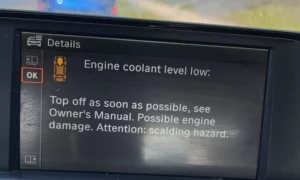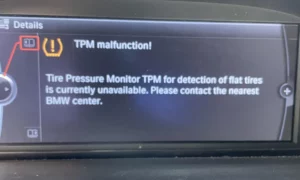If you’re worried about your BMW B48 engine’s reliability, you’re not alone. This turbocharged powerhouse has its set of challenges, like oil filter housing issues and coolant loss. Understanding these common problems can help you keep your engine running smoothly. Dive into the article to learn more about these issues and how you can address them effectively. Discover if the B48 can meet your long-term driving needs.
BMW B48 Engine Overview
The BMW B48 engine is a modern 2.0-liter turbocharged engine that has become a staple in many BMW models. It’s known for its power and efficiency, offering enhancements over previous engines like the N20. You will discover its specifications, see how it stacks up against earlier models, and find out which BMW cars sport this engine.
B48 Engine Specifications
You’ll find the B48 engine offers a balance of performance and efficiency. It’s a 2.0-liter, four-cylinder, turbocharged engine, producing around 190 to 302 horsepower, depending on the model. This engine is equipped with Double VANOS technology, which optimizes the engine speed for better power delivery.
It also features direct fuel injection, ensuring precise fuel delivery, improving overall efficiency. The torque range is impressive as well, typically between 280 to 400 Nm, providing strong acceleration and smooth power delivery. These attributes make the B48 a popular choice for drivers seeking a blend of performance and economy.
Comparison with Previous Models
When comparing the B48 engine to its predecessor, the N20, you’ll notice significant improvements. The B48 has addressed many issues found in the N20, such as major timing chain problems. The B48’s closed-deck engine block design enhances durability and power output.
With better heat management systems and enhanced injection mechanisms, the B48 stands out as more reliable and efficient. Although the B48 shares some design principles with the B58 six-cylinder engine, it maintains its unique characteristics that cater to enthusiasts looking for a compact yet powerful engine.
BMW Models Featuring the B48 Engine
You can find the B48 engine across a range of BMW models. It powers popular models like the BMW 3 Series, BMW X1, and BMW 5 Series. Each of these models benefits from the B48’s blend of power and efficiency, making them appealing for everyday use as well as spirited drives.
Its versatility allows it to fit various car segments, from sedans and coupes to SUVs, providing a consistent driving experience. The spread of the B48 technology across the BMW lineup highlights its significance in modern engine design and performance standards.
Common BMW B48 Engine Problems
When driving a BMW with a B48 engine, you might experience some common issues. Knowing what these problems are can help you address them early and keep your vehicle running smoothly. Below, you’ll find details about some familiar issues you may encounter.
Timing Chain Issues
The timing chain in the B48 engine is crucial for synchronizing the camshaft and crankshaft. If the timing chain stretches or wears out, you might notice a rattling noise coming from the engine. This problem can lead to poor engine performance or even engine failure if not addressed. Regular maintenance and timely inspections can help you catch these issues early. Ensure that any unusual noises are checked by a professional to prevent more severe damage.
Water Pump Failure
The water pump is essential for managing the engine’s temperature. In a BMW B48, the water pump can sometimes fail, leading to engine overheating. Signs of a bad water pump include coolant leaks, high-pitched sounds, or the engine running hotter than usual. If you suspect a water pump issue, it’s crucial to have it checked. Replacement at the first sign of trouble can prevent overheating, which can cause significant engine damage.
Oil Leaks and Valve Cover Gasket
Oil leaks in the B48 often occur due to problems with the valve cover gasket. This gasket seals the valve cover to the engine, and over time, it can wear out. When it fails, you’ll likely notice oil stains under your car or a burning oil smell under the hood. Addressing oil leaks promptly helps maintain engine performance and prevent further complications. Regularly checking for oil spots and unusual smells can help you catch this issue early.
Carbon Buildup Concerns
Carbon buildup is a common issue in direct-injection engines like the B48. Over time, carbon deposits can accumulate on the intake valves, leading to reduced engine efficiency. You might notice rough idling or a decrease in fuel efficiency as a result. Routine cleanings and the use of high-quality fuel can help minimize carbon buildup. Keeping an eye on performance issues and dealing with them promptly ensures the engine runs smoothly.
Coolant Loss
Coolant is vital for engine temperature regulation, and loss of coolant can lead to overheating. This might be caused by a leak in the radiator or hoses, or a faulty water pump. Signs include frequent top-ups of coolant and visible leaks under the car. Observing for these signs and having leaks repaired quickly can help prevent overheating, which could severely damage the engine.
High-Pressure Fuel Pump Issues
The high-pressure fuel pump is key to the B48’s direct fuel injection system. When this pump fails, it can cause engine misfires, rough idling, or even prevent the engine from starting. You may notice a drop in performance or an increase in emissions if the pump isn’t working correctly. Routine checks and timely replacement can help avoid major engine issues related to fuel delivery problems.
Addressing these common BMW B48 engine problems at the earliest sign of trouble helps ensure your vehicle remains reliable and performs at its best. Regular maintenance checks are a wise investment for any BMW owner.
Maintaining Your BMW B48 Engine
Taking care of your BMW B48 engine is essential for keeping it running smoothly and extending its lifespan. Key areas to focus on include regular oil changes, monitoring coolant levels, and maintaining the fuel injection system.
Regular Oil Changes
Changing the oil regularly is crucial to keep your B48 engine in top condition. The engine oil lubricates the moving parts, reducing wear and tear. Fresh oil also helps in cooling the engine and maintaining optimal performance.
It is generally recommended to change the oil every 5,000 to 7,000 miles. Using high-quality synthetic oil can further enhance engine efficiency and longevity. Check the oil level regularly, and always use the oil type that BMW recommends for your specific model.
Keeping an Eye on Coolant Levels
Monitoring the coolant levels in your BMW B48 is vital to prevent overheating and potential engine damage. Coolant helps to regulate the engine temperature, especially during intense driving conditions. The BMW B48 engine is sensitive to temperature fluctuations, so maintaining the right coolant levels is essential.
Check the coolant level every few months and top it up if necessary. Use the coolant type specified by BMW to avoid any issues. If you notice frequent drops in coolant levels, it could indicate a leak, and you should have your engine inspected by a professional.
Inspection and Maintenance of the Fuel Injection System
The fuel injection system in the B48 engine ensures that fuel is delivered efficiently to the combustion chamber. Over time, fuel injectors can become clogged, affecting performance and fuel efficiency. Regular inspection and cleaning of the injection system are necessary to avoid these issues.
Use fuel additives that can help in keeping the injectors clean. If you experience rough idling, reduced power, or increased fuel consumption, it may indicate a problem with the injection system. Addressing these signs promptly can prevent more significant problems down the road. Always ensure maintenance is performed by a certified technician familiar with the intricacies of direct injection engines.













